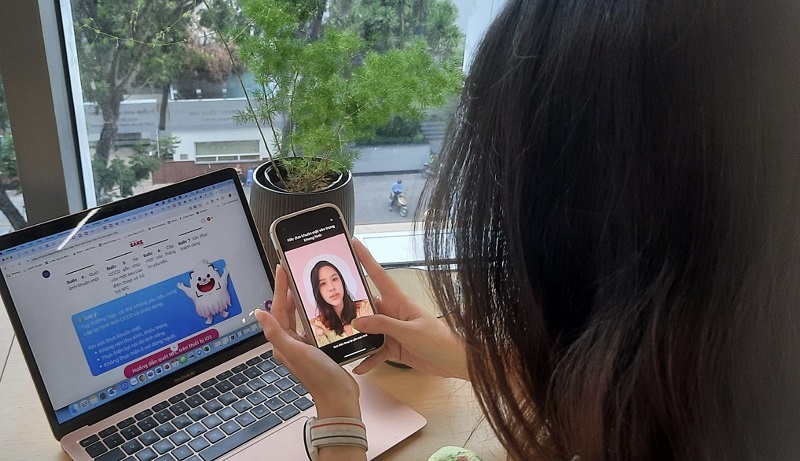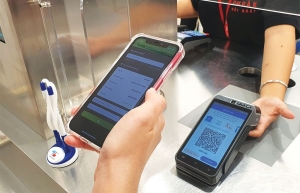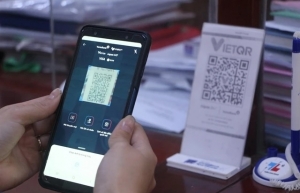The rapid transformation of Vietnam's digital-payment landscape
 |
Since early July, a new regulation which requires facial scans for online money transfers exceeding VND10 million ($393) has shaken the digital payment industry. The requirement is part of the government's efforts to enhance the security of online and card-based transactions amidst the prevalence of online fraud.
As Vietnam is accelerating its shift towards a cashless society, local banks have embraced biometrics for digital payments. As of July 11, 2.6 million out of 9.7 million individual customers at Techcombank have successfully updated facial biometric authentication. Meanwhile, about 3 million customers have updated their biometric information at Vietcombank as of July 15.
In light of soaring biometric adoption, banks and payment firms are racing to incorporate biometric technologies into their financial systems. While banks mainly rely on tech purchases, fintech is quickly taking hold of biometric technologies. Some companies have been certified by iBeta for facial biometric recognition, such as VNPAY, TrueID, Viettel, VNPT, FPT, and VinBigData.
Most recently, Cake by VPBank has successfully developed its own biometric technology called Cake Face Authen. On July 16, Cake became the first digital bank and one of the top five banking and finance organisations in Vietnam to receive an international certificate for facial biometric recognition by iBeta.
Cake Face Authen is refined and optimised based on a large dataset of Vietnamese people to ensure the most accurate results. At the same time, this technology can be customised to different situations and combined with other data sources such as device fingerprints, geolocation, and transaction metadata to enable more flexible decision-making. As a result, this technology can be widely applied in electronic customer identification systems, security control, employee timekeeping, and anti-fraud, among others, offering an advanced solution to digital payment and fintech partners with large user ecosystems.
Besides biometric authentication, Vietnam’s digital payment ecosystem has also witnessed a technological leap with advancements in AI-driven payment solutions.
Nguyen Ba Diep, co-founder of MoMo, said, "To ensure customer security, we have applied multi-layered security and employed AI to detect suspicious transaction activities and alert customers. We are also collaborating with the Vietnam Information Security Association to launch an initiative to introduce customers to security methods and ways to protect themselves from online fraud."
In the same vein, Nguyen Huu Quang, CEO of Cake by VPBank, said, "We are using AI to speed up the loan approval process to just two minutes while enhancing fraud detection on the app. The technology also enables customers to strengthen their accounts' security with biometric authentication, as well as send personalised messages and recommendations based on past user behaviour."
Along with fraud and payment risk protection, payment companies also use AI to acquire more customers, enhance customer engagement, and optimise operational excellence. AI facilitates quicker credit assessments for consumers and businesses, which is critical in enabling simpler and more reliable underwriting and collections.
In light of this trend, Cake has unveiled its ambition to become 'a Next GenAI Bank' and Vietnam's leading digital GenAI bank in 2024. With its extensive experience in AI adoption, the digital bank has also been granted the ‘Best AI Technology Implementation’ Award by The Asian Banker.
Another emerging trend in Vietnam's digital payment landscape is the rapid growth of QR code payments. This technology allows users to make payments by simply scanning a QR code with their smartphones. It is widely used in restaurants, retail stores, and even street vendors. QR codes have made payments more efficient and contactless.
According to Visa’s 2023 Consumer Payment Attitudes study, 88 per cent of respondents have attempted to use cashless payments while 62 per cent of Vietnamese consumers use QR, up from 35 per cent in 2021. To keep up with this trend, Visa has partnered with Vietnam's top e-wallet apps–MoMo, VNPAY, and ZaloPay–enabling Visa cardholders to make effortless QR payments.
As Vietnam's digital payments continue to grow, 'buy now, pay later' (BNPL) services have become more popular. A report by Research and Markets indicates that BNPL payments in Vietnam are expected to grow by almost 42 per cent on an annual basis to reach $3.33 billion in 2024.
BNPL growth is also supported by the low credit card penetration in the Vietnamese market. An increasing number of shoppers are utilising BNPL to fund their purchases, as it provides easier access to credit and higher purchasing power. The trend is expected to continue over the next three to four years, supporting broader industry growth.
To tap into the high-growth sector, domestic firms are competing with regional players like Atome and Kredivo to scale up their operations. Since June, Fundiin has entered into a strategic partnership with the Vietnam National Credit Information Centre (CIC). With credit information from CIC, Fundiin can quickly and accurately assess customer creditworthiness, thereby making effective credit approval decisions.
ZaloPay and Lotte Finance have recently formed a partnership to introduce BNPL services on the ZaloPay app. Meanwhile, Home Credit also teams up with NextPay to roll out the BNPL product, Home PayLater, into the market.
Likewise, Cake and Be Group has launched the bePayLater feature, allowing customers to access the BNLP option for over 15 diverse services on the BE platform.
 | QR codes pushing development in digital payments Due to cheap investment and fast implementation, QR codes have developed quickly to become more popular among customers across industries. |
 | Cashless payment develops rapidly in Vietnam Non-cash payments continue to grow rapidly in Việt Nam, requiring a focus on ensuring payment security, a representative of the State Bank of Việt Nam said at a press conference on Cashless Day 2024 held in Ho Chi Minh City on May 28. |
 | Cashless payments soaring in first half of 2024 The total value of cashless payments through Payoo experienced a sharp rise in the first half of 2024, up by 58 per cent over the same period last year. |
What the stars mean:
★ Poor ★ ★ Promising ★★★ Good ★★★★ Very good ★★★★★ Exceptional
Related Contents
Latest News
More News
- Private capital funds as cornerstone of IFC plans (February 20, 2026 | 14:38)
- Priorities for building credibility and momentum within Vietnamese IFCs (February 20, 2026 | 14:29)
- How Hong Kong can bridge critical financial centre gaps (February 20, 2026 | 14:22)
- All global experiences useful for Vietnam’s international financial hub (February 20, 2026 | 14:16)
- Raised ties reaffirm strategic trust (February 20, 2026 | 14:06)
- Sustained growth can translate into income gains (February 19, 2026 | 18:55)
- The vision to maintain a stable monetary policy (February 19, 2026 | 08:50)
- Banking sector faces data governance hurdles in AI transition (February 19, 2026 | 08:00)
- AI leading to shift in banking roles (February 18, 2026 | 19:54)
- Digital banking enters season of transformation (February 16, 2026 | 09:00)

 Tag:
Tag:



















 Mobile Version
Mobile Version